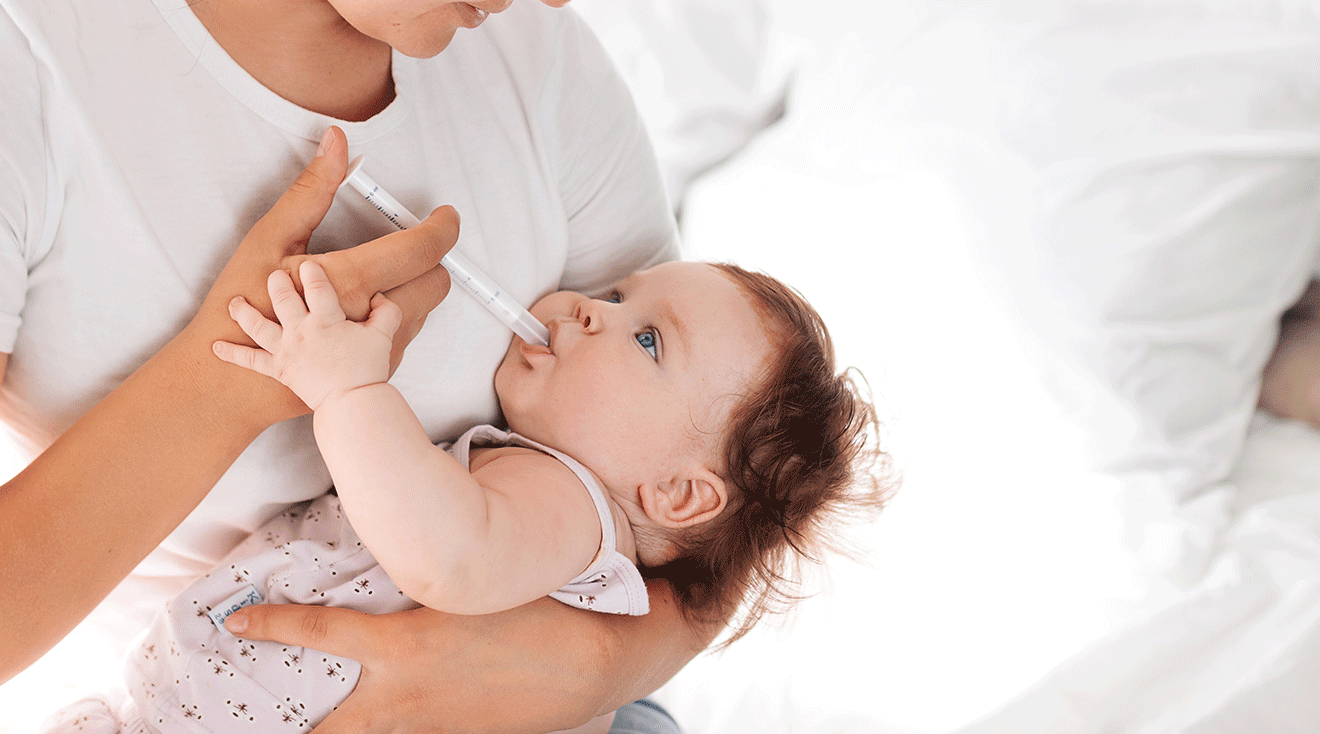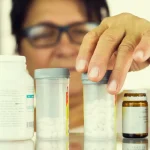
Key facts
- Some medicines for children can only be prescribed by a doctor, and others can be bought over-the-counter in a pharmacy or shop.
- In Australia, the most-used medicines for pain and fever in children are paracetamol and ibuprofen.
- Antibiotics are prescription medicines used to treat infections caused by bacteria.
- Antihistamines are medicines used to treat symptoms of allergies.
- In Australia, giving the wrong medicine dose is the most common cause of accidental poisonings in infants (children under one year of age).
What medicines are commonly given to babies and children?
Medicines for children can be either:
- prescribed by a doctor
- bought over-the-counter in a pharmacy or shop
If your doctor prescribes a medicine for your child, the doctor should tell you:
- the full name of the medicine
- what the medicine is for
- how often it should be taken
- if it is best taken before or after meals, or if it doesn’t matter
- for how long your child should take it
- if there are any common side effects
Make sure you tell your doctor about any other medicine your child is taking, including over-the-counter medicines, complementary medicines, vitamins or supplements. Some medicines interact with each other, so it’s important your doctor knows about all the medicines your child is taking. Also be sure to let the doctor know if your child has any allergies.
Prescription medicines should only be taken by the person they are prescribed for — they should never be shared between people.
If you buy over-the-counter medicines, remember to always follow the written instructions carefully and give the dosage recommended for your child’s weight. Ask your pharmacist for advice.
Here are some of the most common types of medicine given to babies and children.
Medicines for pain and fever
In Australia, the most commonly used medicines for pain and fever in children are:
- paracetamol
- ibuprofen
You can use paracetamol for mild to moderate pain and fever in babies over 1 month of age.
You can use ibuprofen for mild to moderate pain and fever in babies over 3 months of age. Ibuprofen can upset an empty stomach. It’s best to give it with, or soon after, milk or food. Ibuprofen should NOT be given to babies with asthma or a bleeding disorder. Ask your pharmacist if you’re not sure if ibuprofen is a good choice of medicine for your child.
Both paracetamol and ibuprofen come as liquid drops for babies. They are both available over-the-counter in pharmacy without a script.
Discuss using pain medicines with your doctor if your child has pain that keeps returning or lasts for a long time.
Antibiotics
Antibiotics are medicines used to treat infections caused by bacteria.
Your doctor will prescribe the dose of antibiotics your baby or child needs, based on the type of infection. This is called a course. If your baby or child is prescribed antibiotics, it’s important that they finish the whole course, even if the symptoms go away.
Antibiotics don’t work with viruses, including those that cause colds and flu. Read more on the differences between bacterial and viral infections.
Antibiotic resistance is when antibiotics stop working for certain infections. It can develop if you:
- use antibiotics when they’re not needed
- don’t take them properly
Antihistamines
Antihistamines are medicines used to treat symptoms of allergies, such as:
- itching
- sneezing
- swelling
- rash
There are 2 types of antihistamines available:
- those that make you feel drowsy (sedating)
- those that don’t make you drowsy (non-sedating)
Sedating antihistamines such as promethazine are not suitable for children under 2 years of age.
If your child needs an antihistamine, speak to your doctor or pharmacist.
Vitamins and mineral supplements
Your child should be getting all the vitamins and minerals they need without any supplements if:
- they are breastfeeding (and you eat well and regularly)
- they are on infant formula
- your baby has started eating solid food and they are eating a balanced, varied diet.
However, some babies or children may need vitamin and mineral supplements. These include:
- low birthweight babies
- babies or children with some medical conditions
- babies or children on a vegan diet
Check with your doctor if you have any concerns about your child’s nutrition.
Remember, most children do not need vitamin supplements to grow and develop normally.
Are there health conditions that might not need medicines?
Constipation
The best way to help your child pass bowel motions regularly is by ensuring they eat enough fibre (which means plenty of fruit and vegetables, wholegrain bread and cereals). Drinking plenty of water, and staying physically active are also important.
A child who does not have a bowel motion every day is not necessarily constipated. If your child feels pain or discomfort when passing a bowel motion, it is best not to give them over-the-counter laxatives. Instead, see your doctor to find the cause of the problem and get the right treatment.
Sleeping problems
If your child is having sleeping problems, talk to your doctor or child health nurse.
Unless medically advised to, it is best not to give sedating antihistamines (such as promethazine) to children, especially babies, as they may be unsafe. They can also cause side effects including hyperactivity and nightmares.
Do not give your child alcohol as it is likely to harm your child’s health.
It’s always best to check with your doctor or pharmacist before giving your baby any medicine.
What happens if my child has a reaction to a medicine?
Children do not always react to medicines in the expected way. If you think a medicine is not working or if side effects occur, such as rashes, abdominal pain, diarrhoea or drowsiness, let your doctor know.
How do I ensure my child receives the correct dose of medicine?
It’s very important to give your child the right dose of medicine.
If your child has difficulty swallowing pills, ask your doctor or pharmacist if the prescribed medicine comes in another form.
Small children sometimes spit medicines out or refuse to swallow them. If this happens and you think your child is not taking the recommended dose of medicine, ask your doctor for advice.
In Australia, giving the wrong medicine dose is the most common cause of accidental poisonings in children under one year.
There are 3 actions you can take to help protect your child:
- Know how much your child weighs. Medicine doses are calculated based on your child’s weight, so knowing your child’s weight will ensure the dose is accurate.
- Learn how to give commonly used medicines (such as paracetamol) to your child before they get sick. Ask your doctor, pharmacist or child health nurse for advice.
Useful tips for giving your child medicine:
- Know the strength of the medicine. Children’s medicines often come in different strengths for different age groups. Check the strength on the packet before you measure the dose. If you have children of different ages in your household, know which dose to give each child.
- Check the use-by date of the medicine. Take old medicines to your local pharmacy for safe disposal.
- Check the active ingredient/s. It’s important that you don’t give your baby more than one medicine with the same active ingredient. For example, some medicines contain paracetamol on its own, while others include combinations of paracetamol plus another medicine
- Check how the medicine needs to be stored. Some medicines must be kept in the fridge.
How do I give the right dose to my child?
- Always read the dose and measurements carefully. The dose will depend on your baby’s age and weight. Never give more than the recommended dose.
- Shake liquid medicines before measuring out the dose.
- Always use the measuring device provided in the package (such as an oral syringe). If there isn’t a device in the package, ask your pharmacist which device would be best.
- Before using the measuring device, check that it can accurately measure the dose you need. Pay attention to decimal points (for example 0.5 ml).
- If possible, ask another adult to double-check that you are giving the medicine correctly.
When you give your baby or child medicine, write down:
- the name of the medicine
- the time given
- the dose given
- the active ingredient
This will help you avoid over-dosing, especially if another adult gives your child some of their medicine doses.
Don’t add medicines to infant formula, as your baby may not take the full dose if they don’t finish the bottle.
If you’re not sure how much medicine to give, check with your doctor or pharmacist.
How should I store medicines?
- Keep all medicines out of your child’s reach, preferably in a locked child-proof cabinet.
- Keep medicines in the labelled containers they came in.
- Don’t use medicines beyond their use-by-date. Ask your pharmacist how to dispose of out-of-date medicines.
What medicines should I avoid giving my child?
There are some medicines that you should never give to your baby or young child.
- Aspirin should not be given to children under 12 years unless it is specifically prescribed by your doctor.
- Cough and cold medicines (including nasal sprays) are not suitable for children under 6 years.
- Chewable tablets (including vitamins) could cause your young child to choke. Follow the age directions on the package.
- Anti-nausea medicines should not be used, unless instructed by your doctor.
You should also never give your child any medicine that has:
- been prescribed for another person
- been prescribed for another condition
- expired




